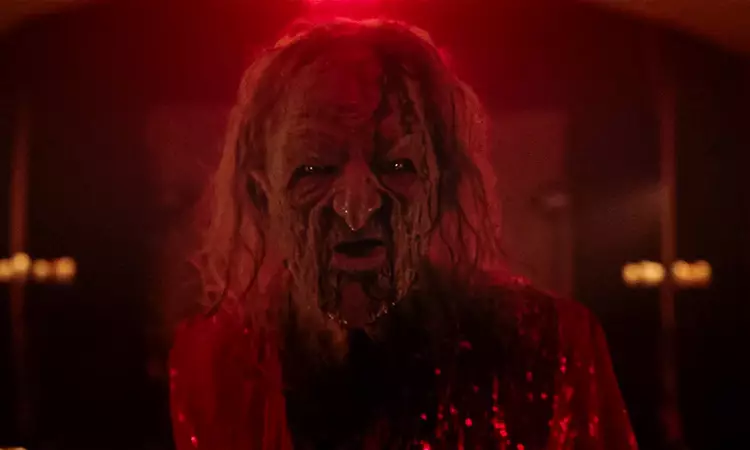In the ever-evolving landscape of horror-comedy, “Members Club” stands out not just for its outrageous premise, but also for its brilliant subversion of traditional gender roles and that concerning male virility. Through its crude humor and grotesque situations, the film offers a scathing commentary on male insecurity, societal expectations, and the absurdity of aging. This article aims to unpack the layers of meaning behind the film’s ludicrous narrative and outrageous characters while examining the societal commentaries that it leverages.
“Members Club” opens with a grim tableau that sets the tone for the absurdity that unfolds. Geoff, the middle-aged protagonist portrayed by David Schall, represents a caricature of male desire and folly. His encounter at the “Members Club” is not merely a setup for crude humor; it’s a direct confrontation with the monstrous aspects of masculinity. The brutal sexual assault featuring a wooden post and the subsequent removal of his tongue serves a dual purpose: it shocks the audience while illustrating the film’s thematic impulse against the backdrop of male impotence and failures.
What is particularly noteworthy is how the film frames its humor through horror. The juxtaposition shocks the viewer and serves to challenge what it means to be masculine in an age where traditional symbols of masculinity—strength, virility, dominance—are rendered grotesque. The underlying commentary paints Geoff as both victim and aggressor, embodying a critique of the toxic masculinity that leads to self-destruction when faced with an ever-changing society.
The quartet of male strippers known as Wet Dreams—Alan, Neil, Ratboy, and Carly—serve as a microcosm of failed masculine ideals. Once the darlings of the Nineties, they now exhibit the physical and professional signs of decay. Their desperation to seize a lucrative gig reflects a broader commentary on aging and obsolescence in a youth-obsessed culture. The male strippers’ plight becomes painfully humorous as they flounder amidst their outdated routines, clinging to a past that no longer holds relevance.
Their manager, “Double Dip” Deano, embodies the tragic lengths to which marginalized men may go to maintain a semblance of relevance. His peculiar anatomical anomaly serves as an exaggerated representation of the absurdity of masculine identity in decline. The absurdity unfolds further as they unwittingly walk into their demise, sacrificing their masculinity—as they face literal castration—as part of a ritual to resurrect a long-dead witch, Agnes Whitewood.
One of the more poignant elements in “Members Club” is Alan’s relationship with his estranged daughter, Daisy. As a father, Alan’s character oscillates between the inept and the predatory. His inability to connect with Daisy amplifies his ongoing existential crisis—a microcosm of a man wrestling with both his past failures and looming irrelevance. The narrative implies that the real horror may not come from the witch or her nefarious rituals; rather, it emerges from Alan’s inability to navigate the shifting dynamics of masculinity and parenthood.
Daisy serves as a vehicle for the film’s critique of male inadequacy, outshining her father in wit and skill. When Alan faces the witch’s supernatural trials, he must also confront the reality of his shortcomings as a father. This duality enriches the narrative, positioning it less as a simple horror-comedy and more as a commentary on the evolution of gender roles, challenging the archaic notion of masculinity that Alan embodies.
The absurdity of “Members Club” is further heightened by a plethora of surreal cameos, including that of Peter Andre as a sleazy figure named Adonis. These appearances serve to exaggerate the ridiculousness of the film’s world. The nonchalant treatment of serious topics—witchcraft, male oppression, and sexual exploitation—creates a jarring juxtaposition that forces the audience to confront their own uncomfortable truths about society’s views on gender.
The film culminates in shocking revelations about male aggression, insinuating that beneath the comedic façade lies a chilling unmasking of the worst traits of masculinity. It raises essential questions about vulnerability, power, and the dark evolution of male identity—prompting viewers to reflect on broader societal implications.
In essence, “Members Club” serves as a brilliant satire on masculinity, utilizing horror and humor to deconstruct stereotypes and unveil the grotesque underbelly of male identity. By marrying absurdity with poignant commentary, the film fosters a space for reflection on aging, sexual politics, and the ever-present demand for men to assert their virility. In doing so, it creates a platform for dialogue on the evolving nature of gender roles, inviting audiences to confront their biases through laughter, shock, and ultimately, introspection.

